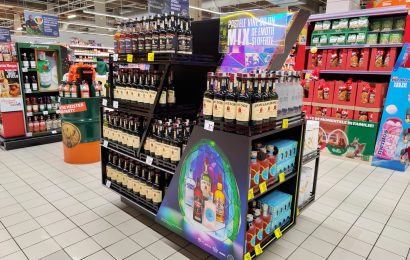Romanian mavericks who started Romanian advertising
Today, during a panel organized at Zilele Biz, the Romanian advertising industry’s mavericks spoke about the beginnings of local marcom and their first “adventures” in the world of advertising.
The ones that shared their memories of the dawn of Romanian advertising, in front of an important audience, were Cristian Burci, president of International Railways Systems and founder of Graffiti BBDO Romania, Dragos Grigoriu- Tempo Creative Group, Radu Florescu- Managing Director Saatchi&Saatchi, Teddy Dumitrescu – President & CEO Publicis Romania, Lucian Georgescu, Managing Partner GAV, Veronica Savanciuc, CEO Lowe & Partners Romania, Stefan Iordache, COO Leo Burnett Group, Manuela Necula, CEO Ogilvy Group Romania. The discussion was moderated by Bogdan Naumovici, Creative Director 23 Communication Ideas.
Maverick-style advertising, in the beginnings of the industry in Romania
Giving an insight on the beginnings of Romanian advertising, the above mentioned speakers depicted a mad men style world, in which they used to have offices in shady hotels, sleep at work over night, set up fake offices with computers in the early ’90s to impress partners or clients.
Among the stories that amused the audiences were the ones about moving outdoor panels through Bucharest so the client could see them in time because the installing wasn’t yet done, inviting clients out for dinner and be sure a TV just happened to be close by so the client could their commercial running and be convinced that everyone saw it or going with a lot of nerve to companies and ask for the boss to come talk (and eventually have the surprise the “big guy” appears and actually needs advertising).
For the Romanian big names in advertising, the starting years also meant changing careers, having the office in the agency owners’ special bath for the dogs or receiving their payment in cash, in a plastic bag.
About entering advertising world, Radu Florescu said he took the step in 1995, Cristi Burci did it because advertising was a niche at the time and there was no competition on the market, while Stefan Iordache chose advertising because it was an industry where you didn’t need money to start working.
Dragos Grigoriu also remembered the way he started in advertising. He remembers that, in 1991, he was upset for not getting a “big” client, some restaurant. He got one of the first important clients, Altrom, by going to the company’s offices and asking for boss to come talk to him. When the owner eventually appeared, he didn’t expected that but eventually closed a deal and made commercials for company’s products for a few years.
He also spoke about the “100%” audience for TV ads – the trick with the restaurant –, saying also the strategy made the clients invest some more.
Stefan Iordache said that, when Leo Burnett Romania got its first big client, Procter&Gamble, they didn’t understand what they wanted so they asked for time to prepare the answer.
Regarding the affiliation to Leo Burnett, Iordache remembered how he went to Otopeni airport with his father’s 14-year-old car and drove the representative of the network to the offices where they had neatly set up computer screens to make it look like a modern place.
The affiliations to international networks came with time, and Lowe went with Lintas, after Veronica Savanciuc said they received six answers regarding a possible affiliation. In what concerns Saatchi&Saatchi, Radu Florescu said that the story of the Saatchi brothers was inspiring (he also has a brother) and was a big factor in his decision regarding an international group to affiliate with.
Teddy Dumitrescu said he decided to affiliate with Publicis because it was the main network in Europe and the other ones already had partnerships with companies belonging to his panel colleagues.
In what concerns Graffiti BBDO, Burci said that the network needed an agency in Romania because it had clients and needed someone to work with.
Some of the budgets mentioned by the speakers were $124,000 for the first contract made by Graffiti BBDO (with Delta Airlines) or $15,000 for a Whirlpool campaign made by Publicis in 1995.
Corporate and serious, 20 years later
According to Radu Florescu, Romanian advertising has, 20 years later, both ups and downs, but creativity has remained at the core of the industry.
Cristi Burci said he thinks the future in advertising and the economy is pretty bleak, as the economic crisis will continue to produce effects in the next couple years. He also spoke about structural problems and ageing population in Europe, saying that as people get old, they tend to lose their capacity to innovate.
He also said the advertising industry will suffer a lot of changes in the next 5 years and people working in the industry must pay attention to everything that happens. According to him, content distribution platforms will multiply a lot and the Romanian advertising industry isn’t yet ready to adapt its way of thinking to a model that entails multi-content distribution platforms and isn’t moving fast enough in that direction.
Burci also said Romania might get find itself unable to pay “unless a miracle happens”.
Dragos Grigoriu remarked that it is clear for everybody that we live times that aren’t “pink” and noticed that the worse thing is this happens cyclically. He also said that nobody should expect authorities to come with favorable laws or facilities for investors and mentioned the only “law” applying right now is that the strong survive. He also noticed that is one of the reasons why people lost their enthusiasm and don’t look inside themselves anymore, to see what they could actually do.
Although he said “we don’t have reasons to be happy”, Grigoriu said that, for the future, the industry must analyze the resources it has and to go forward with the fuel it has inside its people.
Veronica Savanciuc also noticed that Romanian advertising industry has reached a point where it has to manage with whatever resources it has and no help, as it happened in ’90s, at the beginnings of the Romanian advertising story.
She also said agencies must go back to producing quality works and not quantity, because quality is the only thing that can convince clients to stick together with their agencies.
Romanian advertising needs “to wake up”
Manuela Necula from Ogilvy said the Romanian advertising industry needs to wake up, because the year is 2010, there is an economic crisis and costs aren’t the same anymore.
Also, Dragos Grigoriu mentioned that the Romanian advertising industry has self-destructed at a certain point, because the market lived off media for a very long time, charging mainly for that and, many times, not charging for creative work.
He thinks the client-agency relationship must be rethought and started on other foundations, mentioning the agency should tell their clients the budgets they offer do not pay the work and efforts and do not help the market train and educate new people.
Grigoriu also said that the way the advertising market is structured right now is not the right one, mentioning that the divide on specialization is rigid. In his opinion, all these specializations must come back together, as a whole. He also admitted that means to tearing down the old and start building again, from scratch.







One thought on “Romanian mavericks who started Romanian advertising”
Comments are closed.